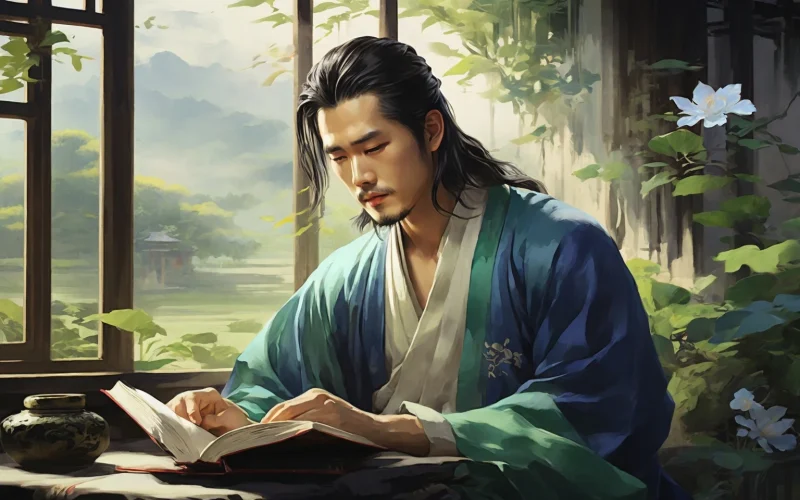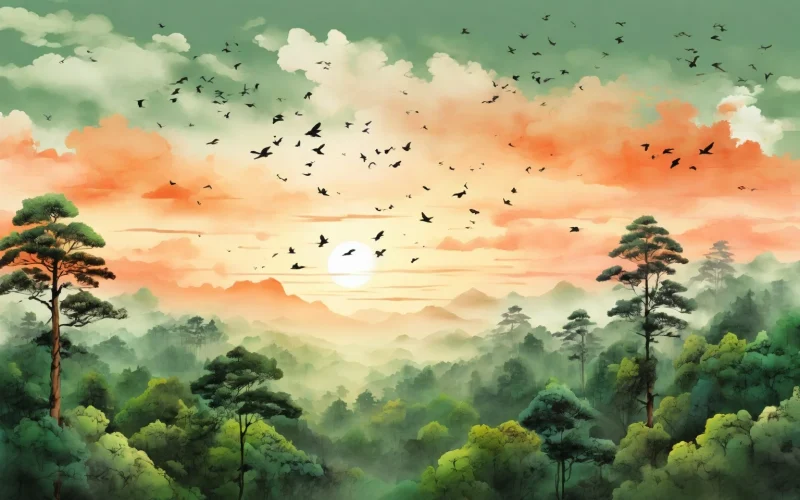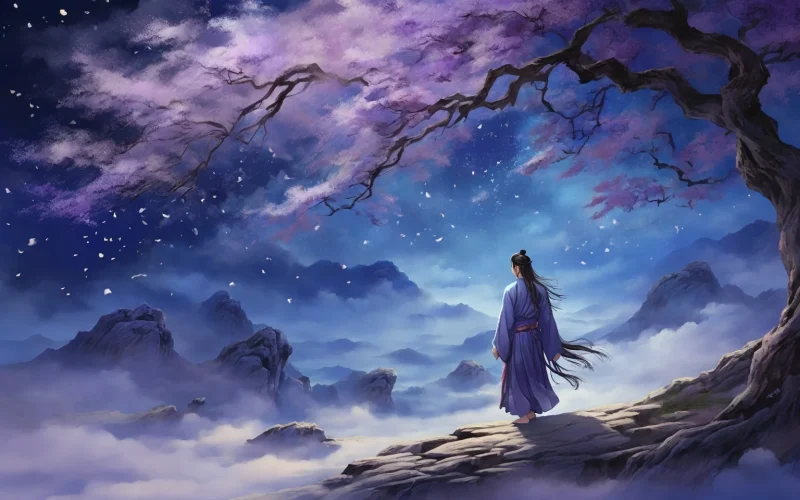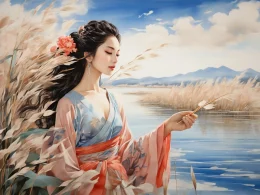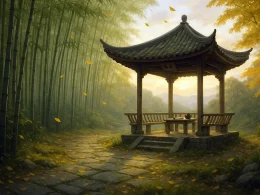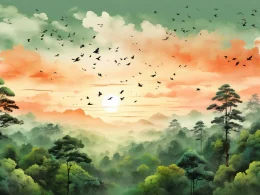When elders talked of bygone years,
Displeased, I would shut up my ears.
But fifty years have gone by now,
And time writes wrinkles on my brow.
I would recall youthful delight,
But I can find no pleasure slight.
Far, far away are bygone days.
Could I relive in olden ways?
To drink my fill I'd spare no gold;
I would keep pace with days grown old.
I'd leave no money for my sons;
There's no need if they're worthy ones.
Original Poem
「读山海经 · 其一」
陶渊明
孟夏草木长,绕屋树扶疏。
众鸟欣有托,吾亦爱吾庐。
既耕亦已种,时还读我书。
穷巷隔深辙,颇回故人车。
欢言酌春酒,摘我园中蔬。
微雨从东来,好风与之俱。
泛览《周王传》,流观《山海》图。
俯仰终宇宙,不乐复何如?
Interpretation
Composed after Tao Yuanming's resignation from officialdom and retirement to countryside life, this poem serves as the opening piece in his thirteen-poem series inspired by The Classic of Mountains and Seas—an ancient compendium of mythical geography. While the text contains fantastical accounts, Tao adopts it as spiritual reading material, blending literary engagement with natural living to express the joys of seclusion and transcendent mindset. Though removed from worldly bustle, his vision expands beyond the cosmos, transcending personal gains and losses to dwell contentedly between landscapes and ancient texts, presenting an idealized vision of liberated existence.
First Couplet: "孟夏草木长,绕屋树扶疏。"
Mèng xià cǎo mù zhǎng, rào wū shù fú shū.
Early summer grasses flourish tall,
Trees surround my hut with leafy sprawl.
Opening with vibrant natural imagery, the lines establish a serene recluse's setting that permeates the entire poem.
Second Couplet: "众鸟欣有托,吾亦爱吾庐。"
Zhòng niǎo xīn yǒu tuō, wú yì ài wú lú.
Flocks rejoice in branches' keep,
I too love my humble retreat deep.
Birds and man coexist harmoniously in nature—their nesting joy mirroring the poet's contentment in austere dwelling, reflecting alignment with natural rhythms.
Third Couplet: "既耕亦已种,时还读我书。"
Jì gēng yì yǐ zhòng, shí huán dú wǒ shū.
Fields plowed and crops sown,
Leisure finds me with texts well-known.
Depicts the ideal hermit lifestyle integrating physical labor ("plowing") and intellectual nourishment ("reading"), embodying the cultivated farmer-scholar paradigm.
Fourth Couplet: "穷巷隔深辙,颇回故人车。"
Qióng xiàng gé shēn zhé, pō huí gù rén chē.
Deep-rutted roads bypass my poor lane,
Yet old friends' carts sometimes turn again.
"Bypassed roads" symbolize detachment from power and fame, while occasional visits add human warmth to quiet solitude.
Fifth Couplet: "欢言酌春酒,摘我园中蔬。"
Huān yán zhuó chūn jiǔ, zhāi wǒ yuán zhōng shū.
Mirthful talk with spring-brewed wine,
Harvesting garden greens divine.
Simple pleasures—conversation, homemade wine, homegrown vegetables—epitomize rustic contentment where material simplicity nurtures spiritual richness.
Sixth Couplet: "微雨从东来,好风与之俱。"
Wēi yǔ cóng dōng lái, hǎo fēng yǔ zhī jù.
Gentle rain drifts from eastern skies,
Kindly winds accompany its sighs.
The poetic realm elevates from objects to atmosphere—the delicate rain and favorable wind embody tranquil joy and mental clarity.
Seventh Couplet: "泛览《周王传》,流观《山海》图。"
Fàn lǎn "Zhōu wáng zhuàn", liú guān "Shān hǎi" tú.
*Perusing *Chronicles of Zhou Kings, *Wandering *Mountains-Seas mystic scenes.*
Historical records and mythological cartography become vehicles for intellectual wandering, reflecting transcendental aesthetic pursuits beyond mundane concerns.
Eighth Couplet: "俯仰终宇宙,不乐复何如?"
Fǔ yǎng zhōng yǔ zhòu, bù lè fù hé rú?
Between glances spans the universe—
What greater joy could one rehearse?
Reaching poetic climax, this couplet reveals ultimate spiritual freedom—cosmic contemplation achieved through stillness and texts, radiating absolute self-sufficiency.
Holistic Appreciation
Though framed as reading The Classic of Mountains and Seas, the poem actually paints an idealized agrarian existence through daily vignettes—physical labor balanced with mental elevation, human warmth complemented by nature's bounty. The described life, while simple, brims with refined beauty: gentle rain, favorable winds, spring wine and garden vegetables all exude leisurely elegance, while "perusing," "wandering" and "spanning the cosmos" elevate mundane routines into philosophical liberation. Tao Yuanming emerges not merely as recluse but as one who integrates universe, nature and self into wholeness, achieving inner fulfillment through contemplative living.
Artistic Merits
The poem flows with natural, unforced language where scenes and emotions merge seamlessly. Its structure progresses from external environment ("flourishing grasses," "rejoicing birds") to internal realization ("cosmic contemplation"), advancing layer by layer. Everyday images—"plowing," "old friends," "spring wine," "gentle rain"—anchor lofty ideals in tangible living. This interplay between concrete and abstract, metaphysical and mundane, creates unique philosophical beauty.
Insights
This poem enlightens that true fulfillment springs not from external power or wealth but from inner peace, life's rhythm and spiritual freedom. Through deceptively simple verses about "spanning the cosmos," Tao Yuanming demonstrates how finding one's tempo between nature and literature can generate profound joy transcending worldly noise. His example whispers across centuries: emancipation begins when we align existence with contemplative harmony.
Poem translator
Xu Yuanchong (许渊冲)
About the poet

Tao Yuanming(陶渊明), 365 – 427 CE, was a poet, literary figure, fu writer, and essayist active during the late Eastern Jin and early Liu Song dynasties. Born in Chaisang (near present-day Jiujiang, Jiangxi Province), he pioneered a new genre of pastoral-themed literature, expressing profound philosophical insights through simple language. His poetic style became an enduring aesthetic standard in classical Chinese poetry.





